| Listing 1 - 10 of 59 | << page >> |
Sort by
|
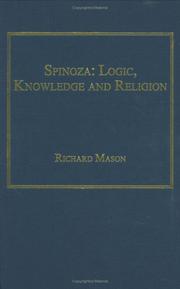
ISBN: 9780754657347 0754657345 9781315242613 9781351898560 9781138275980 Year: 2007 Publisher: Aldershot Ashgate
Abstract | Keywords | Export | Availability | Bookmark
 Loading...
Loading...Choose an application
- Reference Manager
- EndNote
- RefWorks (Direct export to RefWorks)
Spinoza, Baruch --- Spinoza, Benedictus de, --- Ispīnūzā, --- Spinoza, Baruch, --- Espinoza, Baruch d', --- Sbīnūzā, --- Espinosa, Baruch de, --- De Spinoza, Benedictus, --- Shpinozah, --- Shpinozah, Barukh, --- Spinoza, Benedict de, --- Spinoza, Barukh, --- Spinoza, Baruch de, --- Spinoza, Benoît de, --- ספינאזא, ברוך דע --- ספינאזא, ברוך, --- שפימוזה, ברוך --- שפינאזא, בענעדיקט --- שפינאזא, ברוך --- שפינאזע, ברוך --- שפינוזא, בנדיקטוס --- שפינוזהת ברוך, --- שפינוזה, ברוך --- שפינוזה, ברוך די, --- שפינוזה, ברוך, --- שפינוזה, ב. --- سبينوزا، بندكتس --- de Spinoza, Benedictus --- Spinoza, Benedictus de --- Spinoza, Benedict de --- Spinoza, Baruch (1632-1677) --- Connaissance, théorie de la --- Logique --- Religion --- Philosophie
Book
ISBN: 9051667612 Year: 2000 Volume: 76 Publisher: Delft Eburon
Abstract | Keywords | Export | Availability | Bookmark
 Loading...
Loading...Choose an application
- Reference Manager
- EndNote
- RefWorks (Direct export to RefWorks)
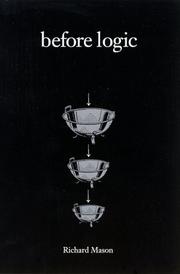
ISBN: 0791445321 Year: 2000 Publisher: Albany State university of New York press
Abstract | Keywords | Export | Availability | Bookmark
 Loading...
Loading...Choose an application
- Reference Manager
- EndNote
- RefWorks (Direct export to RefWorks)
Logic. --- Logic --- Argumentation --- Deduction (Logic) --- Deductive logic --- Dialectic (Logic) --- Logic, Deductive --- Intellect --- Philosophy --- Psychology --- Science --- Reasoning --- Thought and thinking --- Methodology
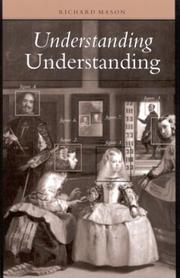
ISBN: 0791486125 1417537744 9781417537747 0791458717 9780791458716 0791458725 9780791458723 9780791486122 Year: 2003 Publisher: Albany State university of New York press
Abstract | Keywords | Export | Availability | Bookmark
 Loading...
Loading...Choose an application
- Reference Manager
- EndNote
- RefWorks (Direct export to RefWorks)
How is understanding to be understood? Are there limits to understanding? What of importance, if anything, could lie beyond understanding? And do we need to understand knowledge before we can know about understanding? Richard Mason's argument is that a critical theory of under¬standing, modeled on past theories of knowledge, cannot be workable.Understanding may bring wisdom: an uncomfort¬able thought for many philosophers in the twentieth century. Yet philosophy aims at expanding understanding at least as much as knowledge. How we understand understanding affects how we understand philosophy. If we put aside a narrow view of under¬standing based upon a Cartesian model of knowledge, we may gain a more liberal, open understanding of philosophy.Mason's treatment of these fascinating problems offers a clear and lucid dialogue with a number of contemporary philosophical schools and with philosophy's past. His discussions include the thought of Hume, Henry James, Heidegger, Frege, Charles Taylor, Michael Oakeshott, Wittgenstein, Gadamer, James Joyce, and the Guyaki Indians. This fascinating book contributes to the work of many of these traditions as well as to the nature of understanding in areas as diverse as physics, music, and linguistics.
Comprehension (Theory of knowledge) --- Knowledge, Theory of --- Logic --- Philosophy --- Knowledge, Theory of. --- Epistemology --- Theory of knowledge --- Psychology
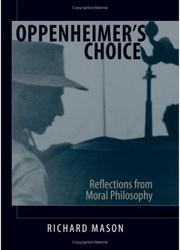
ISBN: 0791481638 1429411856 9781429411851 9780791481639 0791467813 9780791467817 Year: 2006 Publisher: Albany : State University of New York Press,
Abstract | Keywords | Export | Availability | Bookmark
 Loading...
Loading...Choose an application
- Reference Manager
- EndNote
- RefWorks (Direct export to RefWorks)
In 1942, J. Robert Oppenheimer accepted the leadership of the Manhattan Project at the Los Alamos Laboratory, which produced the first atomic bomb three years later. This book examines the ethics of Oppenheimer's choice to take that job and our judgment of his acceptance, leading to the larger question of the meaning of moral judgment itself. Through an analysis of Oppenheimer's choice, Richard Mason explores questions of responsibility, the justification for the pursuit of scientific curiosity, the purity of research, and many other topics of interest in scientific ethics. This unique look at one man's choice brings out the necessary step from personal detail to abstract reflection—it may be easy to praise or condemn Oppenheimer's choice, but less easy to justify our praise or condemnation. Oppenheimer's Choice establishes the possibility of this kind of moral philosophy—neither "applied" nor "practical" ethics, but instead a sustained concentration on a single choice, and what it means.
Ethics. --- Technology --- Deontology --- Ethics, Primitive --- Ethology --- Moral philosophy --- Morality --- Morals --- Philosophy, Moral --- Science, Moral --- Philosophy --- Values --- Technology and ethics --- Moral and ethical aspects. --- Oppenheimer, J. Robert, --- Ou-pên-hai-mo, --- Oppenheimer, Robert, --- Oppenheimer, Julius Robert,
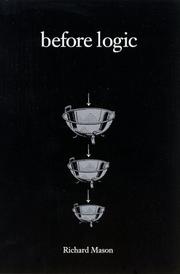
ISBN: 0585301891 9780585301891 0791445313 0791445321 079149280X Year: 2000 Publisher: Albany : State University of New York Press,
Abstract | Keywords | Export | Availability | Bookmark
 Loading...
Loading...Choose an application
- Reference Manager
- EndNote
- RefWorks (Direct export to RefWorks)
"Must logic come first? Are philosophical problems really logical? Must we think logically to think at all? Richard Mason's case is that too much comes before logic - too many choices and too much history. Logic has been formed by choices made by philosophers, not just as a subject of study, but in terms of what has mattered: the problems, and the possible solutions. Before Logic contains case studies of crucial choices: on the formation of logical possibility, on truth, on the explanation of necessity, on essentialism, and on the location of logic. For readers with interests in analytical or continental philosophy or in logic, this book shows why and how history matters to logic."--Jacket.
Logic. --- Argumentation --- Deduction (Logic) --- Deductive logic --- Dialectic (Logic) --- Logic, Deductive --- Intellect --- Philosophy --- Psychology --- Science --- Reasoning --- Thought and thinking --- Methodology
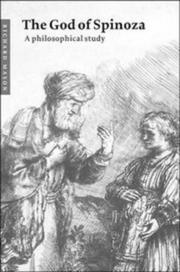
ISBN: 0511005369 0511583230 9780511005367 0521581621 9780521581622 9780511583230 9780521665858 052166585X Year: 1999 Publisher: Cambridge Cambridge University Press
Abstract | Keywords | Export | Availability | Bookmark
 Loading...
Loading...Choose an application
- Reference Manager
- EndNote
- RefWorks (Direct export to RefWorks)
This book is the fullest study in English for many years on the role of God in Spinoza's philosophy. Spinoza has been called both a 'God-intoxicated man' and an atheist, both a pioneer of secular Judaism and a bitter critic of religion. He was born a Jew but chose to live outside any religious community. He was deeply engaged both in traditional Hebrew learning and in contemporary physical science. He identified God with nature or substance: a theme which runs through his work, enabling him to naturalise religion but - equally important - to divinise nature. He emerges not as a rationalist precursor of the Enlightenment but as a thinker of the highest importance in his own right, both in philosophy and in religion.
God --- Philosophical theology. --- Theology, Philosophical --- Philosophy and religion --- Theology, Doctrinal --- History of doctrines --- Spinoza, Benedictus de, --- Ispīnūzā, --- Spinoza, Baruch, --- Espinoza, Baruch d', --- Sbīnūzā, --- Espinosa, Baruch de, --- De Spinoza, Benedictus, --- Shpinozah, --- Shpinozah, Barukh, --- Spinoza, Benedict de, --- Spinoza, Barukh, --- Spinoza, Baruch de, --- Spinoza, Benoît de, --- ספינאזא, ברוך דע --- ספינאזא, ברוך, --- שפימוזה, ברוך --- שפינאזא, בענעדיקט --- שפינאזא, ברוך --- שפינאזע, ברוך --- שפינוזא, בנדיקטוס --- שפינוזהת ברוך, --- שפינוזה, ברוך --- שפינוזה, ברוך די, --- שפינוזה, ברוך, --- שפינוזה, ב. --- سبينوزا، بندكتس --- Religion. --- Philosophical theology --- Dieu --- Théologie philosophique. --- God. --- Histoire des doctrines --- Religion --- de Spinoza, Benedictus --- Spinoza, Baruch --- Natural theology --- Spinoza, Benedictus de --- Views on God --- 17th century --- Spinoza, Benedictus de, - 1632-1677 - Views on God. --- God - History of doctrines - 17th century. --- Arts and Humanities --- Philosophy --- God - History of doctrines - 17th century --- Spinoza, Benedictus de, - 1632-1677 - Religion --- Spinoza, Benedict de --- Spinoza, Benedictus de, - 1632-1677
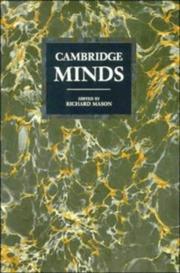
ISBN: 0511884664 0511523009 0521454050 0521456258 Year: 1994 Publisher: Cambridge : Cambridge University Press,
Abstract | Keywords | Export | Availability | Bookmark
 Loading...
Loading...Choose an application
- Reference Manager
- EndNote
- RefWorks (Direct export to RefWorks)
This collection of essays by a group of leading authorities is addressed primarily to a non-specialist readership, with the aim of introducing people and achievements associated with the University of Cambridge over the past 150 years. It explains, in simple terms, what has been done in a wide variety of fields - including philosophy (Ray Monk on Russell, Peter Hacker on Wittgenstein, Robert Grant on Oakeshott); economics (Geoffrey Harcourt on Keynes); anthropology (Ernest Gellner on Frazer); the study of English (Stephen Heath on Richards and Leavis). Some who have made important contributions to Cambridge science describe their own work and discoveries - Max Perutz in molecular biology; Antony Hewish in radioastronomy; Simon Conway Morris in palaeontology. As a whole the book offers an intellectual portrait of many of modern Cambridge's most notable achievements which will be of interest to a broad range of readers within the University and far beyond.
History --- Annals --- Auxiliary sciences of history --- University of Cambridge. --- University of Cambridge --- Academia Cantabrigiensis --- Cambridge. University --- Cambridge University --- Chien-chʻiao ta hsüeh --- Jianqiao da xue --- Kambrija Yeke Surġaġuli --- Kembridzhiĭn Ikh Surguulʹ --- Universität Cambridge --- Ying-kuo Chien-chʻiao ta hsüeh --- Кембриджийн Их Сургууль --- 剑桥大学 --- Chancellor, Masters, and Scholars of the University of Cambridge --- History. --- Cambridge (England) --- Cambridge (Cambridgeshire) --- Jianqiao (England) --- Intellectual life. --- Arts and Humanities
Book
ISBN: 9780859671125 0859671127 Year: 1973 Publisher: Menston: Scolar Press,
Abstract | Keywords | Export | Availability | Bookmark
 Loading...
Loading...Choose an application
- Reference Manager
- EndNote
- RefWorks (Direct export to RefWorks)
Book
Year: 1958 Publisher: Paris: Presses de la Cité,
Abstract | Keywords | Export | Availability | Bookmark
 Loading...
Loading...Choose an application
- Reference Manager
- EndNote
- RefWorks (Direct export to RefWorks)
British --- Painters --- Prostitutes --- Hong Kong (China)
| Listing 1 - 10 of 59 | << page >> |
Sort by
|

 Search
Search Feedback
Feedback About UniCat
About UniCat  Help
Help News
News